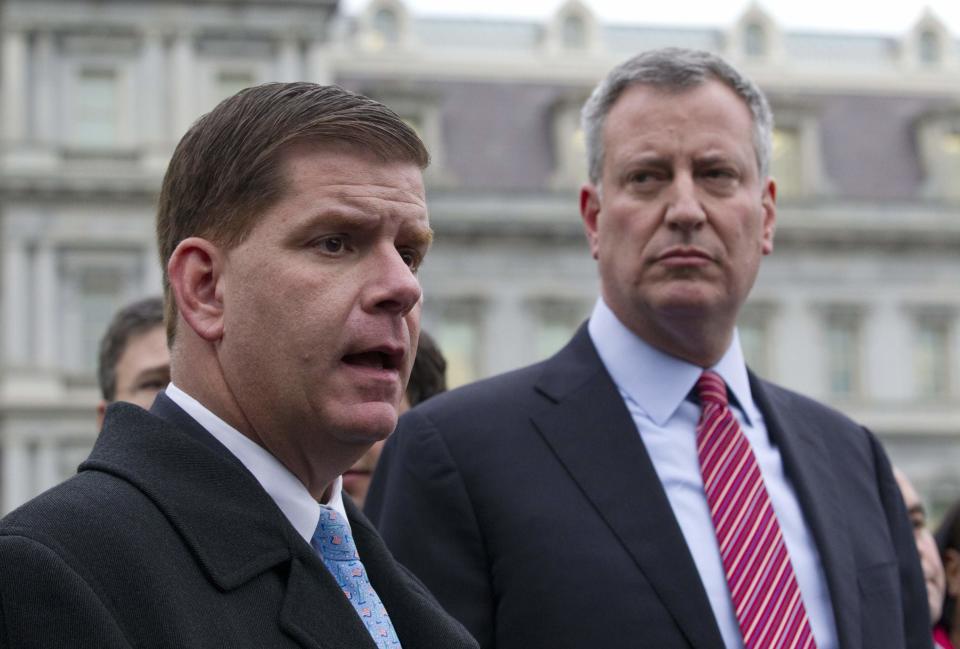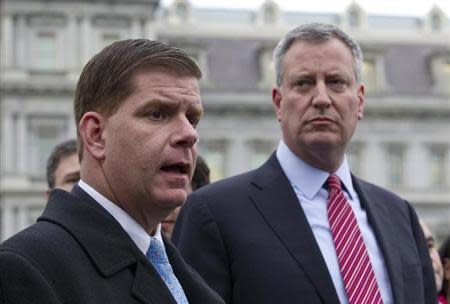Boston mayor skips St. Patrick's parade over exclusion of gay group
By Elizabeth Barber BOSTON (Reuters) - Boston's Irish-American mayor skipped the city's St. Patrick's Day parade on Sunday after failing to hammer out a deal with organizers to allow a group of gay and lesbian activists to march openly. Mayor Marty Walsh had tried to negotiate a deal with organizers, the conservative Allied War Veteran's Council, to allow members of MassEquality, one of Massachusetts' largest gay activist groups, to join the parade. "So much of our Irish history has been shaped by the fight against oppression," Walsh, the city's first Irish-American mayor in 20 years, said in a statement. "As mayor of the city of Boston, I have to do my best to ensure that all Bostonians are free to participate fully in the civic life of our city. Unfortunately, this year, the parties were not able to come to an understanding that would have made that possible." Despite Walsh's boycott, other prominent Democratic Boston politicians, including Representative Stephen Lynch, marched in the parade, which drew tens of thousands of spectators, some of whom expressed disappointment at MassEquality's exclusion. "It's supposed to be a time when everyone can come together," said university student Jeyashri Sridhar, 18. "It's sad that people can't participate because of who they are." Organizers of St. Patrick's Day parades in New York and Boston, among the most liberal-leaning cities in the United States, have come under increasing criticism in recent years for banning openly gay marchers. Parade organizers argue that to do so would conflict with their Roman Catholic heritage. The Catholic church contends that homosexual activity is immoral. DUAL MESSAGE While MassEquality did not participate, the parade was not without gay marchers. South Boston resident Randy Foster, along with his husband Steve Martin, organized a diversity-themed float that sported rainbow flags but no direct gay rights messages. Foster said the flags represented the proverbial pot of gold at the end of the rainbow in Irish lore, though he acknowledged the gay-rights movement uses a rainbow flag. "If there's a dual message to it, we're OK with it and so are the parade organizers," said Foster, 48. "We made the point of not making it a gay float. If we're going to have a message of inclusion, it shouldn't be for one group." New York Mayor Bill de Blasio also plans to boycott his city's parade, scheduled for Monday, in protest. On Friday, two major beer companies, Sam Adams brewer Boston Beer Co and Heineken dropped their sponsorship of parades in Boston and New York, respectively, over the issue. In Boston, Walsh had tried to reach a deal for MassEquality's members to march openly, rather than without any identification of their sexual orientation as required by parade organizers. The invitation to MassEquality was subsequently rescinded by the parade organizers, who said they had been "misled" about the number of veterans in the gay and lesbian group. MassEquality executive director Kara Coredini thanked Walsh for his decision. "No other group is asked to march without a banner and their standard - not the police, firefighters or the Irish," Coredini said. "A double standard is the status quo and does not represent progress." Massachusetts in 2003 became the first U.S. state to legalize gay marriage. Attitudes on gay marriage have changed markedly across the nation since then, with 17 states and the District of Columbia now allowing same-sex couples to wed. (Editing by Scott Malone, Sophie Hares and Marguerita Choy)


